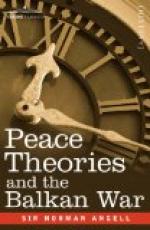CHAPTER V.
OUR RESPONSIBILITY FOR BALKAN WARS.
Mr. Winston Churchill on the “Responsibility” of Diplomacy—What does he mean?—An easy (and popular) philosophy—Can we neglect past if we would avoid future errors?—British temper and policy in the Crimean War—What are its lessons?—Why we fought a war to sustain the “integrity and independence of the Turkish dominion in Europe”—Supporting the Turk against his Christian victims—From fear of Russian growth which we are now aiding—The commentary of events—Shall we back the wrong horse again?
Here was a war which had broken out in spite of all that rulers and diplomatists could do to prevent it, a war in which the Press had had no part, a war which the whole force of the money power had been subtly and steadfastly directed to prevent, which had come upon us not through the ignorance or credulity of the people; but, on the contrary, through their knowledge of their history and their destiny.... Who is the man who is vain enough to suppose that the long antagonisms of history and of time can in all circumstances be adjusted by the smooth and superficial conventions of politicians and ambassadors?
Thus Mr. Churchill. It is a plea for the inevitability, not merely of war, but of a people’s “destiny.”
What precisely does it mean? Does it mean that the European Powers have in the past been entirely wise and honest, have never intrigued with the Turk the one against the other, have always kept good faith, have never been inspired by false political theories and tawdry and shoddy ideals, have, in short, no responsibility for the abominations that have gone on in the Balkan peninsula for a century? No one outside a lunatic asylum would urge it. But, then, that means that diplomacy has not done all it might to prevent this war. Why does Mr. Churchill say it has?
And does the passage I have quoted mean that we—that English diplomacy—has had no part in European diplomacy in the past? Have we not, on the contrary, by universal admission played a predominant role by backing the wrong horse?
But, then, that is not a popular thing to point out, and Mr. Churchill is very careful not to point it out in any way that could give justification to an unpopular view or discredit a popular one. He is, however, far too able a Cabinet Minister to ignore obvious facts, and it is interesting to note how he disposes of them. Observe the following passage:
For the drama or tragedy which is moving to its climax in the Balkans we all have our responsibilities, and none of us can escape our share of them by blaming others or by blaming the Turk. If there is any man here who, looking back over the last 35 years, thinks he knows where to fix the sole responsibility for all the procrastination and provocation, for all the jealousies and rivalries,




